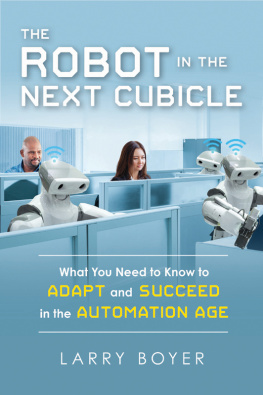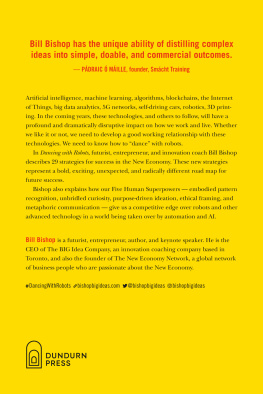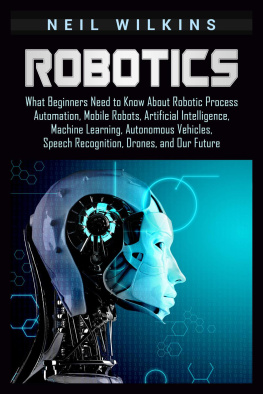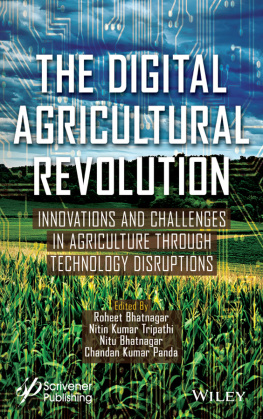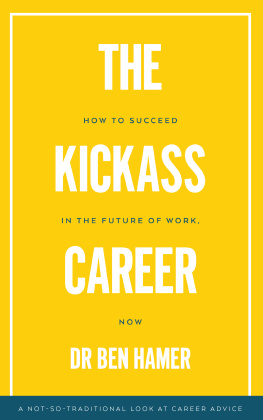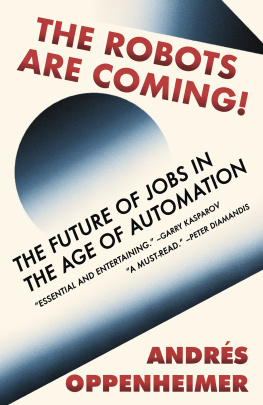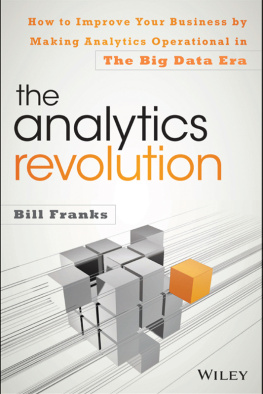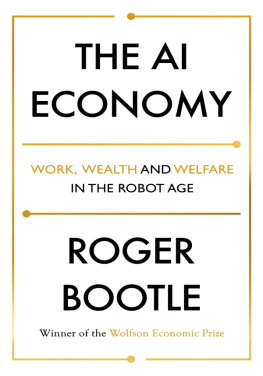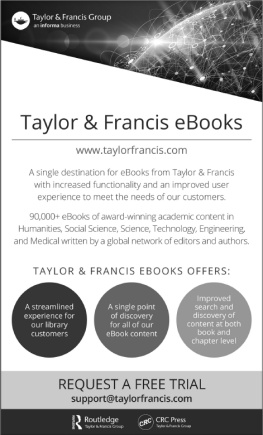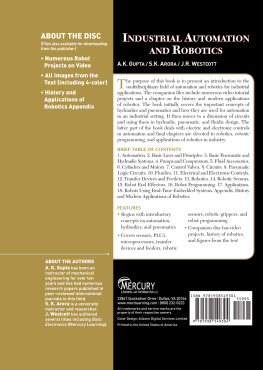
This book is the culmination of a lifetime of experiences, education, and learning from people around the world. I am grateful to everyone who contributed to my ongoing education.
I'd like to acknowledge my editor, Steven L. Mitchell, and the entire team at Prometheus Books. Your belief in the concept and support at each step of the way have been tremendous. Thank you for helping bring the information and messages here to a wide audience.
For help with the research, feedback, and editing of the text I am grateful for the efforts of Stephanie Clarke at Clarke International Writing ServicesTM. Bonnie Karpay, Lawry Boyer, Susan Rooks of Grammar Goddess CommunicationsTM, and Neil C. Hughes at Tech Blog Writer LTDTM for their reviews and support. Raoul Davis and Kirill Storch at Ascendant Group for their longtime support with this project and its supporting projects to help guide people through the coming changes. A special thank-you to Leticia Gomez, my book agent, for finding the right home at Prometheus for this book.
Thank you to Kunal Sood, Sony Mordechai, and Ryan Long for inviting me to participate in the Novus SummitTM at the United Nations in 2016. It was there that the ideas for this book crystallized in my mind, inspired by the incredible works of so many people making an exponential difference. I hope this work helps achieve the UN Sustainable Development Goals.
Greg S. Reid and the Secret Knock community and Berny Dohrmann and the CEO Space International community have been a tremendous influence for my personal development and mind-set, showing me what's possible.
I'm eternally grateful to Wayne Buckhout, my mentor, teacher, and coach. Your unrelenting support and belief in me in my teens built my confidence that you can achieve anything you put your mind to. Not only that, you led by example, showing how to take charge of your life when you left a safe teaching job to build and expand the Cat's Cradle Country Shoppe with your wife, Sandi. I still enjoy visiting the two of you there.
Dr. Dale Ballou took this budding physicist under his wing in the economics department at UMass and helped direct and shape the blending of science, economics, and business. Dr. Ira Gang, who was my advisor at Rutgers University, unwittingly sparked an interest in labor and development economics. Dr. Bayard Catron, my advisor at the George Washington University, inspired me further with issues of global policy, ethics, and decision-making.
To my friends, colleagues, and trainers at iPEC, especially Bruce D. Schneider, Luke Iorio, Mark Schall, Alan Samuel Cohen, and Francine Kolacz Carter, who helped me raise my own self-awareness and learn how to support others through the coaching process. To William Arruda, the Reach Personal Branding community, and Dan Schawbel for shining the light on the value of personal branding.
To my group of close friends and supporters I've met on social media platforms Ecademy, LinkedIn, and beBeeThomas and Penny Power, Juan Imaz, Javier Cmara Rica, John White, Sarah Elkins, Neil Hughes, Marietta Gentles Crawford, Brigette Hyacinth, Milos Djukic, David B. Grinberg, Qamar Ali Khan, Prakashan B. V., Donna-Luisa Eversley, Lisa Gallagher, Susan Rooks, Robyn D. Shulman, Paul Drury, Arnie McKinnis, Jacqui Genow, Andrew Brooks, Chris Spurvey, Lynda Spiegel, Karthik Rajan, Jason Versey, Jan Barbosa, Syed Rashid Jamal, Kanwal Masroor, and Joe Kwonthank you so much.
Finally, a big thank-you and I love you to my wife, Hua Yin, whose support at home has both inspired me and made it possible to dedicate the time to making this book a reality.

Arruda, William, and Kirsten Dixson. Career Distinction: Stand Out by Building Your Brand. Hoboken, NJ: John Wiley & Sons, 2007.
Bates, Laura. The Trouble with Sex Robots. New York Times, July 17, 2017. https://www.nytimes.com/2017/07/17/opinion/sex-robots-consent.html (accessed December 1, 2017).
The Effects of Optimism, Pessimism, and Anger on Health. EHE Newsletter 13, no. 22 (May 29, 2013). https://www.eheandme.com/news_articles/549652445 (accessed December 1, 2017).
Kurzweil, Ray. We Are Entering the Singularity. Kurzweil Accelerating Intelligence, October 6, 2015. http://www.kurzweilai.net/celebrating-the-10-year-anniversary-of-book-the-singularity-is-near (accessed December 1, 2017).
Martin, James. The 17 Great Challenges of the Twenty-First Century. Oxford University, January 2007. http://www.elon.edu/docs/e-web/predictions/17_great_challenges.pdf (accessed December 1, 2017).
Monitoring Environmental Progress: A Report on Work in Progress. Washington, DC: World Bank, September 30, 1995. http://documents.worldbank.org/curated/en/378701468765915443/Monitoring-environmental-progress-a-report-on-work-in-progress (accessed December 1, 2017).
Poole, Heather. Job Creation by Startups and Young Companies. Connecticut General Assembly, 2016. https://www.cga.ct.gov/2016/rpt/2016-R-0003.htm (accessed December 1, 2017).
Rossi, Luke. How Might the Rise of Robots Affect Financial Risk? Barclay Simpson, January 22, 2016. http://www.barclaysimpson.com/news/how-might-the-rise-of-robots-affect-financial-risk-news-801810015 (accessed December 1, 2017).
Sinclair, Upton. The Jungle. New York: Doubleday, 1906.
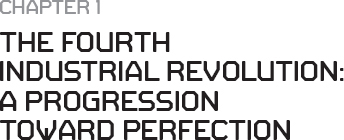
We are living in perhaps the most exciting times in all of human history. The technological advances we are witnessing today are giving birth to new industries that are producing devices, systems, and services that were once only reflected in the realm of science fiction and fantasy. Industries are being completely restructured to become better, faster, stronger, and safer. You no longer have to settle for something that is close enough, because customization is reaching levels that provide you with exactly what you want or need. We are on the verge of releasing the potential of genetic enhancement, nanotechnology, and other technologies that will lead to curing many diseases and maybe even slowing the aging process itself. Such advances are due to discoveries in separate fields to produce these wonders. In the not so distant future, incredible visions of imagination such as robotic surgeons that keep us healthy, self-driving trucks that deliver our goods, and virtual worlds that entertain us after a long day will be commonplace. If ever there were a time that we were about to capture perfection, it is nowand the momentum is only increasing.
Since humans first learned to make fire with primitive tools, technology has frightened, confused, and excited people, bringing with it massive transformations of individual lives and society as a whole. The changes have been both positive and negative as each new wave of technological advancement crashed onto the shores of advancing generations eager to apply their creations. Some people have benefited greatly from mechanical inventions, while others have significantly lost, having their lives turned on end by the radical changes technology delivered. The bottom line is that while everyone has experienced, endured, and adapted to the shifts created by technology's power in an isolated and slowly evolving way, it has been nearly two hundred years since we have seen the scale of change and disruption we are about to witness as we charge headlong into the twenty-first century.
We are currently experiencing what has been dubbed the
Next page
